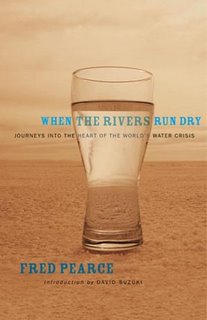 “Water, water, everywhere, Nor any drop to drink.” Rime of the Ancient Mariner – Samuel Taylor Coleridge
“Water, water, everywhere, Nor any drop to drink.” Rime of the Ancient Mariner – Samuel Taylor ColeridgeFred Pearce has been writing and consulting on environmental issues for decades. A highly respected and internationally acclaimed science writer, his newest book, When the Rivers Run Dry: Journeys into the Heart of the World’s Water Crisis, addresses the issue that many scientists contend will be the cause of future world conflicts – the world is running out of water. Earth is awash with water; however, usable water is at a premium. The last sentence of Pearce’s introduction states: “Water, after all, is the ultimate renewable resource.” The question therefore becomes: How is it possible that we are using more water than can be renewed?
Pearce’s contention is that the Western water “footprint” on the rest of the world is a major problem. On average, the water used to feed and clothe most of us for a year takes between 1,500 and 2,000 tonnes, more than half the contents of an Olympic-sized swimming pool. As most of what we eat and wear is grown and manufactured in other countries, we are importing vast quantities of what economists refers to as “virtual water.” What we wear and eat influences the hydrology of producer regions, resulting in a yearly global trade estimated at a thousand cubic kilometers - twenty River Niles.
The small measures we take each day, using low flush toilets or turning off the water while we brush our teeth, while useful on a local scale, have little influence on the majority of water usage. In a system where 11,000 litres are needed to produce the patty used in a McDonald’s Quarter-Pounder, a global solution must be found.
Pearce suggests that the countries currently undertaking massive irrigation projects for food production must reconsider their water usage, weighing the environmental impact of transportation against water depletion. Instead of turning deserts into agricultural land to grow wheat, in some cases using three times as much water as the global norm, countries need to consider importing wheat and other food crops from countries with a lower water cost. New economic models must be developed to consider the true cost of producing food.
When the Rivers Run Dry is an unflinching look at current water situation in more than 30 countries. Just three countries - India, China and Pakistan – account for the usage of more than half the world’s total use of underground water, one-sixth of the world’s usable water. Some of the world’s largest aquifers are under desert sands; however, these aquifers cannot be replaced by rain and in some cases the water being drawn from deep within the earth is thousands of years old. This water is a bank account we are draining dry, dooming the aquifers to extinction: “When a river runs dry, it is very visible. But underground water is invisible…and few in the corridors of power talk…about a slow-burning disaster that will one day affect hundreds of millions of people.” When the water in the world’s aquifers fails, food shortages will follow, undermining the world’s ability to feed itself.
Pearce puts forward that “water flows uphill to money.” If we hope to weather a global climate certain to become more extreme with shifting patterns of precipitation, the world’s governments must stop focusing on the money and instead look at the best interests of the world’s rivers, wetlands and aquifers. Attention must be paid to deteriorating municipal water systems and investments made to fix the potable water leaking into the ground; in some cities, as much as 40% of a city's potable water disappears this way. New attention must be paid to traditional methods of living in harmony with the world’s rivers rather than attempting to tame the rivers through dams and man-made irrigation channels. Desalination of water from the oceans, for agricultural use is still an incredibly cost-prohibitive undertaking.
As David Suzuki states in the foreword: “This...is an urgent warning and a call for action that we must not ignore.” Pearce has delivered a difficult message that should be required reading for all concerned citizens.
Fred Pearce is an environmental and development consultant at New Scientist. Writing about environmental and water issues for more than twenty years, his next book, With Speed and Violence: Why Scientists Fear Tipping Points in Climate Change, is scheduled for release in February 2007.
See the review at ReadySteayBook - When the Rivers Run Dry.


No comments:
Post a Comment